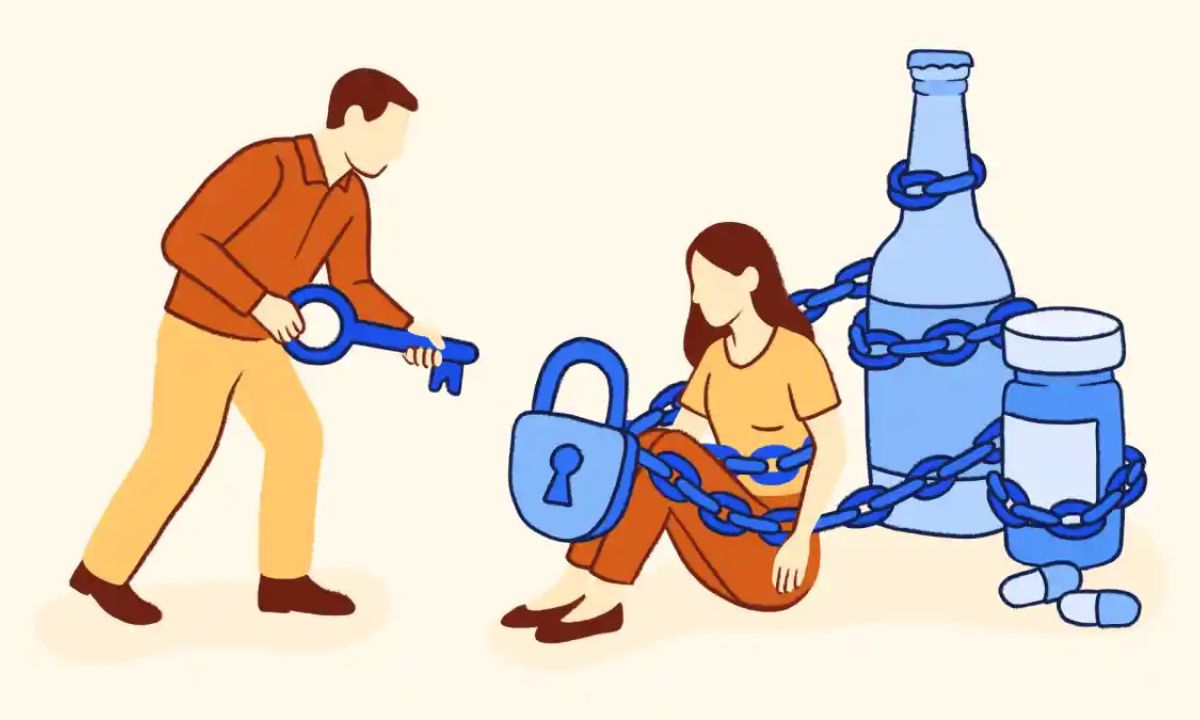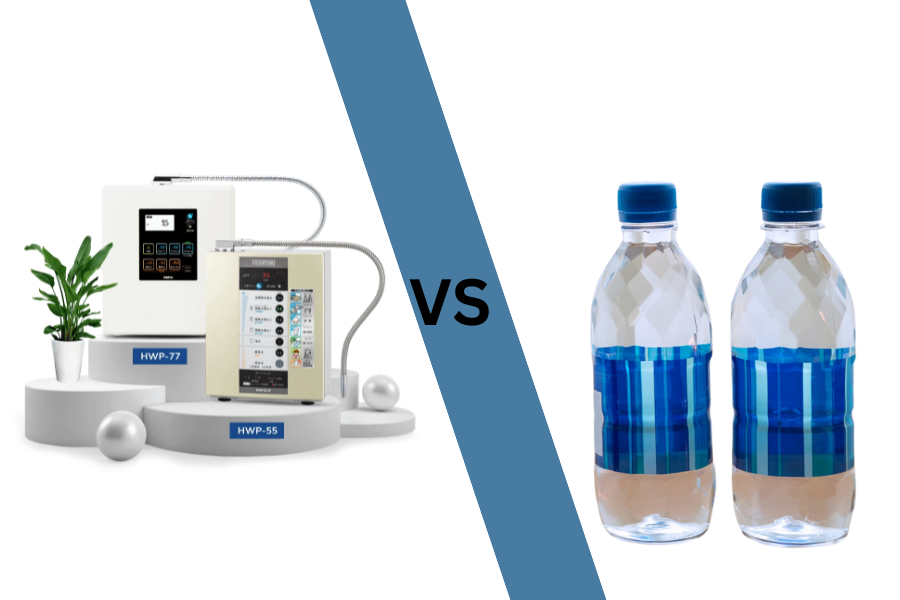The pain and helplessness you feel when someone dear struggles with addiction can be overwhelming. Addiction grips families, causing deep worry and broken trust. It changes relationships in hurtful ways. This article offers clear, useful advice for you. It shows how you can truly support a loved one’s path to sobriety.
It’s vital to see the difference between enabling bad behavior and truly helping someone heal. Genuine support for recovery means finding a balance. You must care deeply, but not at the cost of your own health. Remember, helping someone reach sobriety is a long journey, not just a single moment.
Understanding Addiction: The First Step in Helping
Addiction is a complex issue, best understood from a medical point of view. It’s not a moral flaw or a weakness of character. Instead, addiction is a chronic brain disease. It changes how the brain works over time.
The Brain’s Reward System and How It’s Hijacked
When a person uses a substance or engages in an addictive behavior, it floods their brain with feel-good chemicals. Dopamine, for instance, shoots up, creating a strong sense of pleasure. Over time, the brain gets used to this. It starts to rely on the substance for pleasure, making normal activities feel dull. This change causes powerful cravings and a strong, often unstoppable, urge to use again.
Common Misconceptions About Addiction
Many people still believe harmful myths about addiction. They might think “it’s just a choice,” or “they simply need more willpower.” Some even say, “they could stop if they really wanted to.” However, science proves these ideas wrong. Addiction is a disease, much like diabetes or heart disease. It changes the brain’s structure and how it functions. This makes quitting incredibly hard without help.
Recognizing the Signs and Stages of Addiction
Knowing the signs of addiction helps you step in sooner. Spotting these changes early can make a big difference in someone’s recovery journey.
Behavioral and Physical Indicators
Look for changes in how your loved one acts or looks. You might notice big mood swings, secrecy, or pulling away from family and friends. Their daily duties might go undone, like missing work or school. Money issues often pop up, too. Physically, they might look tired, lose or gain weight, or neglect their hygiene. Different addictions have their own specific signs; for example, an opioid addiction might involve drowsiness or very small pupils.
The Progression of Addiction
Addiction usually unfolds in stages. It often starts with trying something out, then moves to regular use. Next comes problematic use, where issues start to appear. Then, dependence sets in, meaning the body needs the substance to feel normal. Finally, it becomes a full-blown addiction, where control is lost. The sooner you see these signs and act, the better chance there is for successful recovery. Early action truly is key.
Effective Communication Strategies
Talking about addiction can be hard, but doing it the right way makes a huge difference. Your approach matters more than you think.
Approaching the Conversation: Timing and Tone
Picking the right moment to talk is super important. Don’t try to talk when your loved one is under the influence. Avoid times when they’re stressed or upset. Instead, find a calm, private place where you both feel safe. Choose a moment when everyone is clear-headed.
Using “I” Statements and Expressing Concern
When you talk, focus on your feelings and worries. Say “I” statements instead of pointing fingers. For example, instead of “You always lie about your drinking,” try “I’ve been worried about you because I notice your drinking has increased.” Speak with kindness and understanding. Show them you care, without judging. Your goal is to open a door, not shut it.
Active Listening and Validation
Listening well shows you truly care. It helps your loved one feel heard.
The Power of Empathetic Listening
When they talk, truly listen to their words and feelings. Try repeating back what you hear, like “It sounds like you’re feeling overwhelmed.” Ask open-ended questions that need more than a yes or no answer. This helps them open up. Be patient and let them speak without cutting in. Just hearing them out can be a big step.
Validating Their Feelings Without Endorsing Behavior
It’s important to acknowledge their feelings, even if you don’t agree with their actions. You can say, “I understand you’re feeling a lot of pressure right now.” This shows empathy. But be clear that you don’t support their addiction. You might add, “But I’m worried about how you’re coping with it.” This validates their pain but still highlights the problem behavior.
Setting Boundaries and Encouraging Professional Help
Setting limits protects you and helps your loved one face their choices. These steps are crucial for supporting sobriety.
Establishing Healthy Boundaries
Boundaries are firm rules about what you will and will not accept. They are essential for both your well-being and the recovery of your loved one.
What Are Boundaries and Why Are They Crucial?
Boundaries are clear lines you draw to protect yourself from harmful behaviors. They help you stay healthy and avoid getting pulled into the addiction cycle. For the person struggling, boundaries encourage them to take responsibility for their own actions. They learn that their choices have real consequences. Without boundaries, you risk enabling the problem, making it harder for them to seek help.
Practical Examples of Setting Boundaries
It helps to have clear examples of boundaries. You might say, “I will not lend you money if I suspect it will be used for drugs.” Or, “I cannot cover for you at work anymore.” Another boundary could be, “I will leave if you start using substances in my home.” The key is to set these limits and then stick to them every single time. Consistency makes boundaries effective.
Navigating Treatment Options and Professional Support
Once boundaries are set, the next step is often encouraging professional help. There are many paths to recovery.
Types of Addiction Treatment
Addiction treatment comes in many forms. Detoxification helps the body clear the substance safely. Inpatient rehab offers a full-time, structured living environment. Outpatient rehab allows people to live at home while attending therapy and groups. Therapy, like individual, group, or family counseling, helps address the root causes of addiction. Medication-assisted treatment (MAT) combines medicine with therapy for a whole-person approach. Each person needs a treatment plan made just for them.
How to Encourage Seeking Professional Help
Start by doing some research yourself. Look up local treatment centers or trusted groups that help with addiction. Offer to help them make appointments or even go with them to a first meeting. Mention reliable resources like the Substance Abuse and Mental Health Services Administration (SAMHSA) website. Local support groups for families, like Al-Anon, can also offer valuable information and support on addiction recovery.
Supporting the Recovery Process
Getting sober is a long journey, and your steady support can make a big difference. Patience is a must.
The Importance of Ongoing Support and Patience
Recovery isn’t a straight line. There will be good days and hard ones. Your consistent presence and understanding matter greatly.
Celebrating Milestones, Big and Small
Acknowledge every step of progress, no matter how small. Did they stay clean for one day? Did they attend a meeting? Did they start a new hobby? Celebrate these wins. High-fives, kind words, or a shared quiet moment can reinforce positive changes. Recognizing their effort shows them you see their hard work and believe in their ability to continue supporting sobriety.
Understanding Relapse as Part of the Process
It’s common for people to slip up during recovery. A relapse is not a sign of failure. Think of it as a bump in the road, a chance to learn and try again. If a relapse happens, react with calm concern, not anger. Focus on getting them back on track quickly. Talk about what went wrong and what steps they can take next.
Self-Care for the Supporter
Helping someone through addiction is incredibly taxing. You must also take care of yourself.
Recognizing and Managing Your Own Stress and Emotions
Supporting a loved one with addiction takes a huge emotional toll. You might feel worried, angry, or sad. It’s important to know these feelings are normal. Find ways to ease your stress. Try simple things like walking, spending time in nature, or reading. Make time for hobbies you enjoy. Protecting your own mental health is not selfish; it’s necessary.
Seeking Support for Yourself
You don’t have to go through this alone. There are groups just for families of people with addiction, such as Al-Anon or Nar-Anon. These groups offer a safe place to share your feelings and learn from others. Talking to a therapist or counselor can also provide you with tools and strategies. Getting help for yourself makes you a stronger support for your loved one.
Conclusion
Guiding a loved one toward sobriety is truly a marathon, not a quick sprint. It takes much patience, honest talks, and clear, firm boundaries. Seeking professional help is a vital step for the person struggling. Equally important, you, the supporter, must practice self-care. This difficult journey needs courage and strength from everyone involved. A caring and supportive setting is a powerful part of healing.
ALSO READ: Why Rehab Works: A Comprehensive Guide to Addiction Recovery Programs ?











